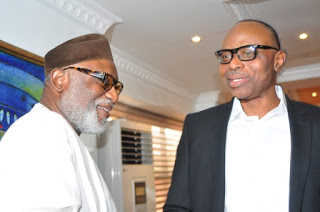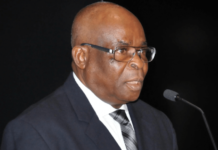Last Friday’s event in Ondo State when former Governor Olusegun Mimiko passed the baton to Governor Rotimi Akeredolu was of singular significance. It was the first time in Ondo State that power was passing from one elected incumbent to another without the acrimonious atmosphere of intrigues and even violence. It was indeed time for both Mimiko and Akeredolu to make history and to signal to the rest of Yoruba land that politics could be of a different hue from the old habiliments of war.

I was in Akure in 1983 when Chief Michael Adekunle Ajasin lost his job as the first elected governor of old Ondo State. Ajasin was our Grand Patron when I was the president of the National Association of Ondo State Students and on this platform, we met several times. Therefore, for me, Ondo State was a familiar territory when I was posted to Akure as the Chief Correspondent of the Concord Group of Newspapers owned by the billionaire philanthropist, Chief Moshood Abiola. By the time of the coup of December 31, 1983, Ondo State was still recovering from the bloody uprising following the declaration of Chief Akin Omoboriowo of the National Party of Nigeria, NPN, as the winner of the 1983 governorship election.
With the return of Chief Ajasin to power following the rulings of the election tribunal, members of the political class were confident that the game would continue. Only few people knew that the Second Republic, born of so much hope, was about to come to grief.
Then the announcement on the radio by the unfamiliar voice of “I Brigadier Sani Abacha!” on December 31, 1983. Governor Ajasin quickly packed his bags from the Government House and drove in his private car to his home in Owo. The Abacha announcement was going on throughout most of the day. By the evening, we were told we had a new Head of State, Major-General Muhammadu Buhari. On January 1, 1983, Akure people, like the rest of Nigerians, were greeting each other: “Happy New Year! Happy New Government!”
But it was not a happy moment for the former governor. After the coup, he was invited to the Government House, Akure, to meet the new governor, Commodore Michael Bamidele Otiko, an indigene of Akure, who was a teacher before he joined the navy. For more than a week, Ajasin was kept incommunicado in one of the guest chalets in the sprawling Government House ground. One day, he was woken up in the wee hours and asked to get ready to meet the new governor. He had not had his breakfast. Soon, he was driven out in a Land Rover, sandwiched among fully armed soldiers. He never met the new military governor.
Instead, after preliminary detention at Bonny Camp, Victoria Island, Ajasin and his other colleagues, Lateef Kayode Jakande of Lagos, Olabisi Onabanjo of Ogun, Bola Ige of Oyo and Ambrose Alli of Bendel (now Edo and Delta States), were transferred to Ikoyi Prison, the first step into the long winter of military rule. Ajasin and the others were to remain in detention until the brief autumn that ushered in the new regime of self-proclaimed president, General Ibrahim Badamasi Babangida in August 1985.
Election was not to hold again until the brief summer of 1991 when Evangelist Bamidele Olumilua, a retired diplomat and farmer, was elected the new governor of Ondo State. Olumilua’s government was to have a great influence on the future of the state. His deputy was the young geologist, Dr. Olusegun Kokumo Agagu and his Commissioner for Health was the young physician, Dr. Olusegun Mimiko. Both were future collaborators and rivals in the power game of Ondo State.
Olumilua reigned at turbulent times when the military ruler, General Babangida annulled the victory of Chief Abiola in the June 12, 1993 presidential elections. By November 1993, democracy was history when General Sani Abacha, Babangida old collaborator, toppled Chief Ernest Adegunle Shonekan, who was presiding over the Interim National Government, ING, a make-shift edifice quickly put together in the wake of General Babangida disorderly retreat from power. In Akure, Olumilua, along with the other members of the power elite, was sent into the political wilderness. His successor, Colonel Mike Torey, was unsympathetic, but he spared the former governor the indignity of detention.
By 1999 when another round of politics began, Olumilua was in full retirement in Ikere, his hometown in Ekiti State. (Ekiti was created from the old Ondo State in 1996). In 1999, the game was that of Afenifere, the mainstream Yoruba political and cultural organisation that dominated the South-West and the Alliance for Democracy, AD, political party. Olorunnibe Farunkanmi, a Second Republic senator and wealthy town planner was favoured to win the governorship ticket of the party but the music changed when it became obvious that Chief Olu Falae, a former Secretary to the Government of the Federation, SGF, was to become the presidential flag-bearer of the AD. Farunkanmi is from Iju while Falae is from Akure and both used to belong to the same local government. Farunkanmi then withdrew in favour of Chief Adebayo Adefarati, a retired teacher and former commissioner in Ajasin’s cabinet. Adefarati’s main opponent was the formidable Chief (Mrs) Mobolaji Osomo, who also served in Ajasin’s cabinet.
Adefarati fared better than his two elected predecessors. He became the first Ondo State elected governor to leave office as a result of electoral defeat instead of a military coup. Adefarati’s downfall was a fate foretold. His regime has been facing internal fission and external attacks from the opposition Peoples Democratic Party, PDP. His unnecessary squabble with Otunba Niyi Adebayo, his Ekiti State colleague over the issue of Afenifere and the funding and leadership of Ondo State University (now called the Ekiti State University); Ado-Ekiti did not help matters.
I stumbled into the fray unintentionally. In late 2000, I had been invited, being the chairman of the Alajobi Committee of the Yoruba Nation, to deliver the 79th birthday anniversary lecture of Afenifere leader, Senator Abraham Aderibigbe Adesanya, at the National Arts Theatre, Iganmu, Lagos. Due to a sudden domestic emergency, I could not deliver the lecture personally and my distinguished colleague, Jimi Agbaje, one of our leaders in Alajobi, stood in for me. In the lecture, we advised that the AD governors, considering the political situation in the South-West, should not seek for a second term. Instead, they should join the leadership to create a successor generation of leaders that would bring stability to Yorubaland.
Three weeks later, I met with Baba Adefarati in Akure. He said he would contest for a second term. He was confident of winning, trusting in his records as a committed Awoist and veteran grassroots politician. Soon, the posse was at the gate, led by Agagu and other young Turks. Agagu became governor in 2003 riding on the wings of President Olusegun Obasanjo blitzkrieg that swept the South-West and installed PDP governors in all the state except Lagos where Governor Bola Tinubu became the last man standing.
The Agagu coalition was not designed to last. It was soon bedeviled by the same dynamics that toppled Adefarati. By 2007 when he was running for a second term, his main opponent was Mimiko, his old colleague in the cabinet of Governor Olumilua who, when the romance was at its zenith, served Agagu as the Secretary to the State Government, SSG. In the controversial 2007 general election, Agagu was declared the winner by the Independent National Electoral Commission. Mimiko challenged the victory at the tribunal. The Court of Appeal, sitting in Benin, affirmed Mimiko’s victory in February 2009 and Agagu’s governorship became history.
Now history is made with Mimiko becoming the first Ondo State governor to run the full course of two terms. He is the fourth governor in the South-West to run a full two-term. He joins the league of Tinubu, Babatunde Fasola of Lagos State and Gbenga Daniel of Ogun State. Like Daniel, he has handed over power to an opposition party. It is to his credit and that of his successor that both have applied wisdom to ensure that the transition, despite the expected tension, was accomplished with decorum, civility and minimum rancor. This was the first time this would be happening in Ondo State. We will always remember this.
It is a great pity that in the Winner-take-all presidential system, there is no public role for the second position. Were this to be the old parliamentary system, the assembly would have benefitted from the sagacity and experience of the other leading candidates, especially Olusola Oke of the Alliance for Democracy, AD, Eyitayo Jegede of the PDP and Olu Agunloye of the Social Democratic Party, SDP. Agunloye, my distinguished friend, former minister and pioneer corps marshal of the Federal Road Safety Corps, is the kind of person; perspicacious, gregarious, noble and empathic, who would have been begged to be governor in another time and age. But in the contemporary Ondo State, he was an ‘also-ran’.
For both Ondo State and its new governor, it is another opportunity to make history. Akeredolu wears a luxuriant beard of the wise that makes him look like an old-time revolutionary instead of the monied bourgeois that he truly is. During the campaign, he promised to make life more abundant. Now is the time to keep that promise.
This opinion by Dare Babarinsa was written after the inauguration of Ondo State Governor, Oluwarotimi Akeredolu on Friday, 24th February, 2017.











